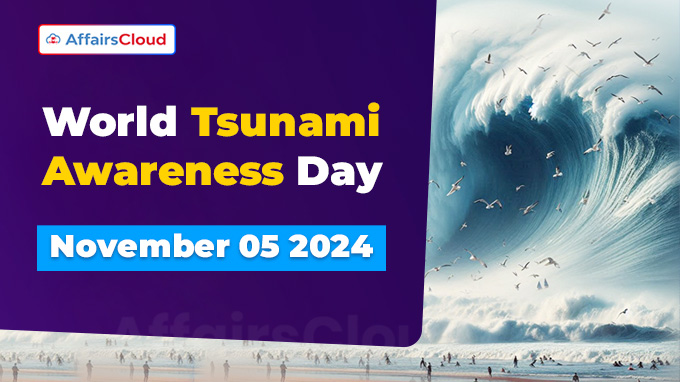 The United Nations (UN’s) World Tsunami Awareness Day (WTAD) is annually observed across the globe on 5 November to raise public awareness of the devastating impacts of tsunamis, promote understanding of safety measures, and implement early warning systems for such natural disasters.
The United Nations (UN’s) World Tsunami Awareness Day (WTAD) is annually observed across the globe on 5 November to raise public awareness of the devastating impacts of tsunamis, promote understanding of safety measures, and implement early warning systems for such natural disasters.
- The UN Disaster Risk Reduction (UNDRR) facilitates the observance of WTAD in collaboration with the rest of the UN system.
Note: The word “tsunami” comprises the Japanese words “tsu” (meaning harbour) and “nami” (meaning wave).
Theme:
The theme of WTAD 2024 is “youth and future generations”.
- The planned activities for the observance aim to commemorate the 20th anniversary of the Indian Ocean Tsunami by sharing its lessons with a new generation of children and youth.
Background:
i.On 22 December 2015, the United Nations General Assembly (UNGA) adopted the resolution A/RES/70/203 and declared the 5 November of every year as World Tsunami Awareness Day.
ii.WTAD was initiated by the Government of Japan, drawing from its history of handling tsunamis effectively.
iii.The first WTAD was observed on 5 November 2016.
Why November 5?
The designation of 5 November as WTAD comes from the “Inamura-no-hi” (The fire of rice sheaves) an anecdote about a Japanese village leader, Goryo Hamaguchi, who saved the lives of people in his village by setting fire to sheaves of rice on 5th November 1854.
Inamura-no-hi:
i.It was based on a true story at the time of the Ansei-Nankai Tsunami (1854), which claimed around 3,000 lives in the coastal areas of Western Japan.
ii.The Japanese village leader, who noticed a precursor of a large tsunami at the earliest stage had set fire to his sheaves of rice, rapidly alerting the village to evacuate.
iii.The Asian Disaster Reduction Center (ADRC) developed Tsunami educational materials with fundamental knowledge of tsunamis in 8 nations, utilising the “Inamura no Hi” narrative, funded by the Government of Japan.
Significance:
i.The day serves as a reminder for nations worldwide to prioritize disaster preparedness and resilience-building measures.
ii.The aim of WTAD coincides with the International Day for Disaster Reduction (13 October), the Summit of the Future (22-23 September) and the 7 global targets of the Sendai Framework for Disaster Risk Reduction 2015-2030.
Sendai Framework for Disaster Risk Reduction 2015-2030 (SFDRR):
i.SFDRR is a 15-year international agreement adopted at the 3rd UN World Conference on Disaster Risk Reduction, held from 14 to 18 March 2015 in Sendai, Miyagi, Japan.
This agreement is to succeed the Hyogo Framework, the first comprehensive global agreement on disaster risk reduction.
ii.It aims to achieve the substantial reduction of disaster risk and losses in lives, livelihoods and health and the economic, physical, social, cultural and environmental assets of persons, businesses, communities and countries over the next 15 years.
Tsunami Ready Programme in India:
i.In response to the tsunami on December 26, 2004, the government of India (GoI) set up the Indian Tsunami Early Warning Centre (ITEWC) at the Indian National Centre for Ocean Information Services (INCOIS) in Hyderabad, which has been operational since October 2007.
ii.It is an international community-based recognition programme developed by the Intergovernmental Oceanographic Commission (IOC) of the United Nations Educational, Scientific and Cultural Organization (UNESCO).
iii.It adheres to 11 best-practice indicators outlined by the Intergovernmental Coordination Group for the Indian Ocean Tsunami Warning and Mitigation System (ICG/IOTWMS) of UNESCO-IOC.
Tsunami Ready Villages of India:
i.The Indian Tsunami Ready Board had nominated 2 villages in India that received UNESCO-IOC Tsunami Ready recognition.
ii.According to that, Noliasahi (Jagatsinghapur district) and Venkatraipur (Ganjam district) villages in Odisha have been declared “Tsunami Ready” as part of a UNESCO-implemented programme in 2020.
These were the first two ‘Tsunami Ready’ villages in the Indian Ocean Region (IOR).
About Intergovernmental Oceanographic Commission of United Nations Educational, Scientific and Cultural Organization (IOC-UNESCO):
Executive Secretary– Vidar Helgesen
Member States– 150
Headquarters– Paris, France
Established– 1960




